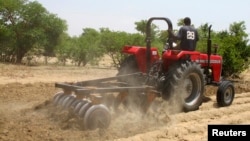Nigeria’s government plans to wean the country from years of overdependence on oil production by transforming the agricultural sector into the cornerstone of the economy, according to Agriculture Minister Akinwumi Adesina.
Some Nigerians say lack of leadership and political will by several governments led to the neglect of the agricultural sector, the backbone of the country’s economy before the discovery of oil. Nigeria is currently Africa’s biggest oil producer.
But Agricultural minister Adesina said the government has implemented measures to transform agricultural production to produce food for local consumption in a bid to end the country’s high-rate import bill.
“The objective is to use agriculture as a wealth creator to diversify the economy to create wealth and to create a lot of jobs,” said Adesina.
Aggressive goals
The target is to produce 20 million tons of additional food by 2015 according to Adesina.
Analysts say there is no reason why Nigeria should be importing basic staples such as rice and wheat when the country is blessed with more than 84 million hectares of arable land for agricultural production to meet local consumption and exports.
Adesina admits the dependence on oil production has often left Nigeria susceptible to the volatility associated with global commodity prices. He says the administration’s agricultural policy is aimed at sharply reducing the shocks the economy receives due to the global commodity prices.
“The economy needs buffers and agriculture is what we have always done. We had agriculture before we had oil. We were the largest producer of palm oil in the world, we were the second largest producer of cocoa in the world, we were the largest producer of groundnuts in the word, so we can just basically return to back to basics, which is do agriculture, and unlock wealth,” said Adesina.
“An agriculture that is modern, an agriculture that is commercial, market-oriented, an agriculture that is seen not as a way of managing poverty,” Adesina said. “We are going to be a global player in the food and agricultural market and that in trying to do that we are going to unlock wealth all across the country.”
Boosting investment
Adesina says investments in agriculture plummeted following the country’s oil discovery and production.
“We were not investing in agricultural research and as a result rural poverty grew because of that,” said Adesina.
He said the first step was to register all farmers to ensure proper planning and implementation of policies and to weed out corruption.
“The second thing that we did was to fix the input supply system that will get improved seeds and fertilizers to our farmers,” said Adesina. “Because we have the biometric information of our farmers, we are able to reach our farmers on their mobile phones. So we send electronic vouchers tour farmers by phone for their seeds and fertilizers, which they will then use and redeem straight off from the input retailers all over the rural areas.”
Adesina says the government has engaged the private sector, which he says is the engine of growth, to boost the agricultural sector and associated businesses.




